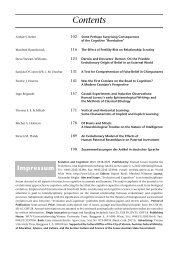The Seven Sins of Evolutionary Psychology - Konrad Lorenz Institute
The Seven Sins of Evolutionary Psychology - Konrad Lorenz Institute
The Seven Sins of Evolutionary Psychology - Konrad Lorenz Institute
Create successful ePaper yourself
Turn your PDF publications into a flip-book with our unique Google optimized e-Paper software.
Jaak Panksepp and Jules B. PankseppPsychopathology (ASCAP) group, has been a clearforce in providing new perspectives for future developmentsin biological psychiatry. While DSM-IV diagnosticshave stabilized into a practical and economicallyuseful way to deal with mental disordersin our society, it should not be seen as anything closeto the final scientific word. <strong>The</strong> goal now should beto link many emotional disorders to the activity <strong>of</strong>specific brain systems. <strong>The</strong> conceptualization <strong>of</strong> thebasic emotional systems <strong>of</strong> the brain (e.g., PANKSEPP1998a, 2000b, 2001b) should be an essential component<strong>of</strong> future understanding in this area.GARDNER also highlights several higher-order emotionalissues that should be fascinating to evolutionarypsychologists. <strong>The</strong> ‘alpha communication’ stylethat is evident in manic patients is also evident inmany scientific discussions. Given the choice, practicallyall scientists and scholars are more eager to talkabout their own work and ideas than to listen to thestories <strong>of</strong> others. This urge to talk rather than listento the next fellow is a very prominent feature <strong>of</strong> ourspecies and it needs to be explained by the evolvedfeatures <strong>of</strong> our communicative apparatus. We suggestthat such urges are much more dependent on subcorticalemotional systems (e.g., dominance mediatingones) than intrinsic ‘drives’ <strong>of</strong> cortico–cognitivebrain systems that epigenetically specialize in languageskills. We note that modern neuroscience hasdemonstrated, in abundance, the extent to whichseemingly pre-ordained cortical functions can betaken over by other functions, as MEISENBERG asserts,in a ‘guns for hire’ fashion.In any event, there will be many interesting clinicaland evolutionary psychological predictions to bemade once we fully understand the primitive sources<strong>of</strong> our emotionality. It is noteworthy that groups suchas ASCAP have emerged to provide “understandable,unfanciful, common-sensical and data-based explanations”<strong>of</strong> human behavior. In this vein, we also notethat the recent emergence <strong>of</strong> a neuro-psychoanalyticmovement that has deep respect for the primitiveemotional systems that all mammals share, is anotherharbinger <strong>of</strong> a new age <strong>of</strong> reason in the way we studythe human mind/brain (see http://www.neuropsa.com).It also is not shy about fully consideringevidence collected from our fellow species.Gerhard Meisenberg:Modularity is Alive and Well… SupposedlyMEISENBERG seems to agree with our overall thesisand takes the opportunity to provides a wide-ranginganalysis <strong>of</strong> instances <strong>of</strong> cortical functions thatneed more attention than we provided, as well asquestioning some <strong>of</strong> our specific conclusions. Thisrepresents the type <strong>of</strong> discussion that needs to beexpanded in evolutionary psychology and the keyissue from our perspective, once again, is the degreeto which higher neocortical functions are modular(genetically-dictated functions) as opposed to experientiallymodularized (epigenetically derived specializations).We have no doubt that a great deal <strong>of</strong> the neocortexbecomes highly specialized (‘modularized’?) as afunction <strong>of</strong> experience, explaining the power <strong>of</strong> theKennard Principle in neurology (functional recoveryis more complete following brain damage in youththan in old age), but aside from a variety <strong>of</strong> discretemotor and sensory/perceptual processes (many <strong>of</strong>which MEISENBERG elaborates upon, with which wehave no disagreement), we still want to suggest thatno sociobiology-type, cognitive ‘modules’ are yetclose to being demonstrated (as our original intentwas to distinguish examples such as facial/emotionalrecognition and appreciation capacities fromthe more cognitive types, which may not have beensufficiently clear in our target article). Certainly, verybasic sensory and motor processes became specializedin the neocortex <strong>of</strong> ancestral mammals a verylong time ago, but our main point was that there isessentially no evidence yet that modularized, sociobiologicalcognitive adaptations have emerged inthe neocortex since our neocortical divergence from‘chimp-brained’ anthropoids some two millionyears ago. It presently does not appear that most <strong>of</strong>what evolved in the neocortex since then was intrinsicallymodular, but rather, general purpose tissuethat could become modularized under the influence<strong>of</strong> environmental factors interacting with functionallydedicated limbic and more primitive subcorticalnetwork functions as organisms mature. To ourknowledge, there is no credible evidence against thistype <strong>of</strong> epigenetic–developmentalist view. It is <strong>of</strong>course important from a neuropsychological perspectiveto analyze these developmentally emergentspecializations since they are incredibly importantin neurological practice. However, in our estimation,such evidence does not really relate directly to theissue <strong>of</strong> evolutionary modularity.We have no conceptual disagreement withMEISENBERG when he discusses the emergence <strong>of</strong>smiling (which can actually be exhibited by newborninfants), but we disagree with the suggestionthat the relevant neurology is merely concentratedin the cingulate cortex. <strong>The</strong>re is as much evidencethat the insula and several other cortices participateEvolution and Cognition ❘ 62 ❘ 2001, Vol. 7, No. 1








